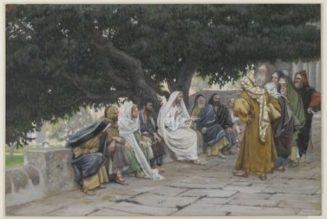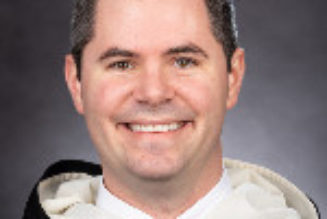
The great English Dominican friar, Bede Jarrett, once gave a series of Lenten conferences based on the theme “Here we have no abiding city” (Hebrews 13:14). Jarrett explained, “If you are traveling, the whole secret of a happy journey is to remember always that you are a traveler.” The temptation, of course, is to try to settle down in this life, to pretend like the here-and-now is all that there is or will be.
But there’s no permanent rest to be had in this life. We are called to further our progress, to pursue Christ above all. And yet, the temptations remain: to linger, to dally, to be stagnant.
Among the many pernicious temptations which haunt the darkened corridors of our souls, three are, at the present time, especially nefarious.
The first is the perennial temptation to doubt the power of Christ. “I’ve always been this way,” we tell ourselves. We cling to shades and gloom, preferring the comfort of our own brokenness to the Gospel’s call to conversion.
Pope Francis warns us that in this mentality, a kind of sadness can set in. This sadness is “a sadness that stifles every effort at change and conversion by sowing resentment and hostility. That is no way to live a dignified and fulfilled life; it is not God’s will for us, nor is it the life of the Spirit, which has its source in the heart of the risen Christ.” The desert fathers called this kind of sorrow acedia.
Acedia is a kind of self-centeredness that can only be cured by consciously rousing the soul from its slumber. It must be fought by turning devotedly to the ascetical practices of Lent: fasting, increased prayer, increase in almsgiving. Lenten practices fight back against disinterest and carelessness of heart.
According to St. Therese of Lisieux, “to brood gloomily over our own imperfection paralyzes our soul.” Every fault, every temptation, every sorrow of life must be handed over to Christ, who alone conquers them. For the Little Flower, her faults even increase her confidence in Jesus’ work in her life. She writes
I entrust my infidelities to Jesus for, in my audacious abandonment to Him, I believe that I shall in this way gain greater power over His Heart and attract more fully the love of Him who came not to call the just but the sinners.
At its worst, acedia prohibits the Christian from enjoying even the joy of the Lord. Acedia can cause a sourness in the taste of spiritual things. Devotions and religious practices that once nourished us can be spurned, even despised because of acedia.
Christ is always willing to grant the power to conquer this slumber. As St. Paul declares, “Through the obedience of the one, the many will be made righteous” (Romans 5:19). Christ wants to rouse our souls: “Awake, O sleeper, and arise from the dead, and Christ shall give you light,” (Ephesians 5:14).
The second temptation flourishing in our age is to doubt the power of the Church. In light of the many scandals and, God preserve us, ongoing revelations concerning the myriad ways religious leaders have taken advantage of the faithful through financial and sexual scandals, who among us hasn’t asked himself: What is Christ doing?
How can the Church be a witness to conversion in this day and age, when our leaders are repeatedly discovered to be embroiled in scandal. What kind of confidence can we have in the Church’s ability to announce anew the saving power of the Word of God?
No one with eyes to see could miss the deep truth of St. Paul’s description of the ministers of Church: “We hold these truths in earthen vessels.” Clay vessels: worn, chipped, and tired. As Bishop Barron points out,
The vessels are fragile and many of them are downright broken; but we don’t stay because of the vessels. We stay because of the treasure.
In every age there are faithful souls crying out, telling the world to look to God! The Lord will, indeed is now, raising up saints who fearlessly announce the need to seek meaning in the higher things, the way of life of the Gospel. Only God allows us to make sense of this universe; only Christ accounts for the deepest mysteries of the human heart!
Finally, the third temptation is to doubt the influence we can have in our own communities. The first Christians rejoiced in their Sunday gatherings. After all, Christ and Christ alone, is the victor over sin and death!
St. Ignatius of Antioch wrote to the Ephesians,
Take heed, then, often to come together to give thanks to God, and show forth His praise. For when you assemble frequently in the same place, the powers of Satan are destroyed, and the destruction at which he aims is prevented by the unity of your faith.
Every soul in a pew on Sunday matters. The body suffers when members aren’t present.
Further, some Christians seem to expect others to take care of this or that thing in the parish. Here’s the truth: It’s your duty!
No soul gets to have a “personal” relationship with Christ without His body, the Church. To really encounter Christ, to love him, is to consent to loving Him with others. The charity which grows and fosters in a living relationship with Jesus will necessarily impel a soul to love and care for His Church.
That means your parish. Here and now.
Indulging in these temptations clouds our minds and hearts. If we cling to them, they deform our very selves. Our souls become entrenched in vice, and moulded by these shades of darkness.
Christ is our hope. He is our glory! He can banish the lingering melodies of torments, whose echoes threaten us that we’ll never change. Christ can convert us. He can change our hearts. If we are changed, He’ll renew the Church. That renewal will spread like fire, and we can enkindle the fires of renewal even in our own communities.
In the words of Bede Jarrett,
May [God] give us all the courage that we need to go the way He shepherds us. That when He calls, we may go unfrightened. If He bids us come to Him across the waters, that unfrightened we may go. And if He bids us climb the hill, may we not notice that it is a hill, mindful only of the happiness of His company. Even if He calls us to a last desolation, though He seem absent, He will be there. If He calls us to bitter agony, that too would be an honor and a privilege, since our agony would be still only a sharing of His agony; He would have lifted the coverlet of suffering and brought us in to lie by His side.
He made us for Himself, that we should travel with Him and see Him at last in His unveiled beauty in the abiding city where He is light and happiness and endless home.









